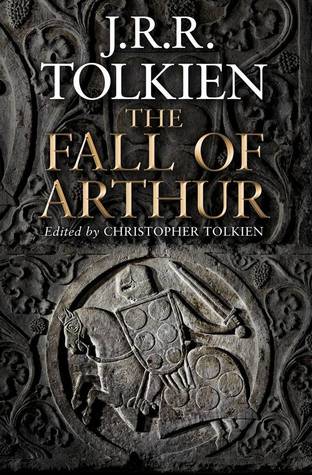 SUMMARY (from Goodreads): The Fall of Arthur recounts in verse the last campaign of King Arthur who, even as he stands at the threshold of Mirkwood, is summoned back to Britain by news of the treachery of Mordred. Already weakened in spirit by Guinevere's infidelity with the now-exiled Lancelot, Arthur must rouse his knights to battle one last time against Mordred's rebels and foreign mercenaries.
SUMMARY (from Goodreads): The Fall of Arthur recounts in verse the last campaign of King Arthur who, even as he stands at the threshold of Mirkwood, is summoned back to Britain by news of the treachery of Mordred. Already weakened in spirit by Guinevere's infidelity with the now-exiled Lancelot, Arthur must rouse his knights to battle one last time against Mordred's rebels and foreign mercenaries.
Powerful, passionate and filled with vivid imagery, The Fall of Arthurreveals Tolkien's gift for storytelling at its brilliant best. Originally composed by J.R.R. Tolkien in the 1930s, this work was set aside for The Hobbit and lay untouched for 80 years.
Now it has been edited for publication by Tolkien's son, Christopher, who contributes three illuminating essays that explore the literary world of King Arthur, reveal the deeper meaning of the verses and the painstaking work that his father applied to bring it to a finished form, and the intriguing links between The Fall of Arthur and his greatest creation, Middle-earth.
MY OPINION:
Anyone expecting The Fall of Arthur to be an epic story dealing with Arthurian legends, would be disappointed, as The Fall of Arthur is only Tolkien’s unfinished attempt at his own retelling of the legend of King Arthur.
Tolkien’s poem, written in a form that more or less resembles the Old English alliterative verse, is only about 40 pages long. The rest belongs to Christopher Tolkien’s explanation of his father’s possible sources for the poem as well as his writing process and finally an excerpt from Tolkien's lecture on alliterative verse.
The poem itself, though beautifully crafted, is a clear evidence of Tolkien’s dwindling interest in it, or perhaps running out of time for finishing and editing it, as the beginning is clearly better done, especially in terms of the rules of alliterative verse, than the end. Yet, even in such an unfinished state, the poem is still another proof of Tolkien’s genius.
The rest of the book, with speculations on sourcing and development of the poem, may be of no interest to people only looking for a story, or may seem boring, as its value is above all meta-linguistic and meta-literary. However, to me – from a writer’s point of view – it was not only interesting, but also inspiring to see a glimpse of Tolkien’s writing process and his approach to it, both concerning this particular work as writing in general.
Hence, The Fall of Arthur was a fascinating read, and I enjoyed it very much.
RECOMMENDATION: The Fall of Arthur is largely a non-fictional, analytical read, and as such quite demanding but intriguing. However, it might be a disappointment if you just want a good story.


No comments:
Post a Comment
Don't hesitate to drop me a few strange new words! I'd love to hear what you think!